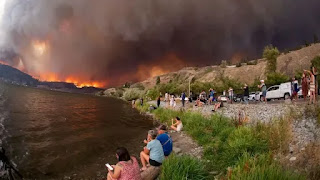The McDougall Creek Wildfire in Kelowna, British Columbia, poses a significant threat to lives and properties after growing significantly overnight. Officials have warned the fires are very active and unpredictable, with thousands of people facing the stress of leaving their homes without knowing if they will be there when they return. The fire has grown one hundredfold in 24 hours, and local BC officials declared a state of emergency on Friday morning. More than 2,500 properties have since been evacuated, with thousands more on alert to leave on short notice.
The fast-moving fire is bearing down on a city with a population of about 150,000 people, and officials are already reporting "significant structural loss", including in Trader's Cove in the Okanagan Valley. West Kelowna fire chief Jason Brolund said the actions taken to rescue members of the public and save homes in the area had been akin to "a hundred years of firefighting all at once in one night." No deaths have yet been reported, but Mr Brolund said the fire remains "dynamic" and "as significant today as it was last night", a preview of what may come in the days ahead.
Residents are used to the fires because of Kelowna's "California-style climate," but the heat, dryness, and wind seen in recent days had created the "perfect conditions for a firestorm", Ms Loewen added. The airspace around Kelowna International Airport has now been closed to everything other than aerial firefighters. Some 2,000km (1,240 miles) north-east, winds blowing in the Northwest Territories on Friday and Saturday could push the blaze outside Yellowknife closer towards the city and one of its highways, the Ingraham Trail.
Successful firefighting efforts have made meaningful progress in holding back the fire over the last two days, and it remains about 15km (9 miles) north-west of the city's municipal boundary. Air tankers are flying missions day and night in an effort to further slow the fire. The Canadian government has said enough pilots will be made available to man the evacuation flights leaving the city.
Some essential workers have yet to evacuate the city. Among them is Dr Lori Regenstreif, usually based out of Ontario but who has been working in the Northwest Territories over the last week. She said it has been surreal watching the territory's capital city go from being a hub for wildfire evacuees from other parts of the Northwest Territories earlier this week to being under its own state of emergency.
The streets have been left deserted, and restaurants and businesses have shuttered their doors. Patients continue to be airlifted out of hospitals as of Friday. Those who remain in the city are mostly firefighters, police officers, doctors, and nurses. One pharmacy in town remains open, Dr Regenstreif said, as its owner refuses to close it. As the weekend nears, the smoke in the air has cleared up, but there is a sense of unease as the wildfire continues to burn nearby.







0 comments:
Post a Comment